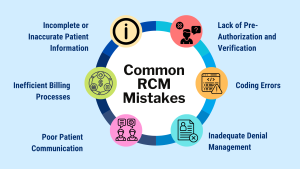Introduction
Revenue Cycle Management (RCM) is a critical component of any healthcare practice, encompassing the entire process of managing patient revenue from appointment scheduling to the final payment. Effective RCM is essential for maintaining a healthy cash flow and ensuring the financial stability of a healthcare organization. However, several common mistakes can disrupt this process, leading to revenue losses and operational inefficiencies. In this blog, we will explore these common RCM mistakes and provide strategies to avoid them.

1. Incomplete or Inaccurate Patient Information
One of the most frequent RCM mistakes is the collection of incomplete or inaccurate patient information. Errors in patient demographics, insurance details, or medical records can lead to claim denials and payment delays.
How to Avoid:
- Thorough Patient Registration: Ensure that the patient registration process is comprehensive and includes verifying all demographic and insurance information.
- Use of Technology: Implement electronic health records (EHR) systems and automated verification tools to reduce human error and ensure accuracy.
- Regular Training: Provide regular training for front-end staff on the importance of accurate data entry and verification procedures.
2. Lack of Pre-Authorization and Verification
Failing to obtain necessary pre-authorizations or verify insurance coverage before services are rendered can result in claim denials and non-payment.
How to Avoid:
- Pre-Authorization Protocols: Establish clear protocols for obtaining pre-authorizations and insurance verifications before the patient’s visit.
- Dedicated Staff: Assign a dedicated team or staff member to handle pre-authorizations and insurance verification to ensure compliance.
- Technology Integration: Use automated systems to check for insurance coverage and authorization requirements in real time.
3. Coding Errors
Incorrect or incomplete coding is a common mistake that can lead to claim denials or underpayments. Errors in Current Procedural Terminology (CPT) codes or International Classification of Diseases (ICD) codes are particularly prevalent.
How to Avoid:
- Regular Training and Updates: Provide regular training for coders and billing staff on the latest coding guidelines and updates.
- Audit and Review Processes: Implement regular audits of coding practices to identify and correct errors.
- Use of Technology: Utilize coding software and tools that automatically suggest the most accurate codes based on clinical documentation.
4. Inadequate Denial Management
Failing to manage claim denials effectively can lead to lost revenue and increased accounts receivable. Without a structured denial management process, practices may struggle to identify and address the root causes of denials.
How to Avoid:
- Denial Tracking System: Implement a denial tracking system to identify common denial reasons and take corrective actions.
- Regular Review Meetings: Conduct regular meetings to review denial trends and develop strategies to address recurring issues.
- Dedicated Denial Management Team: Assign a team to focus on denial management and work on resolving denied claims promptly.
5. Poor Patient Communication
Ineffective communication with patients about their financial responsibilities can lead to delayed payments and increased bad debt.
How to Avoid:
- Clear Communication: Provide clear communication about billing and payment expectations during patient registration and throughout their care journey.
- Transparent Billing Statements: Ensure that billing statements are clear, concise, and easy for patients to understand.
- Multiple Payment Options: Offer multiple payment options, including online portals, to make it easier for patients to pay their bills.
6. Inefficient Billing Processes
Inefficient billing processes, such as delayed claim submission or lack of follow-up on unpaid claims, can lead to cash flow issues and increased accounts receivable.
How to Avoid:
- Streamlined Billing Processes: Implement streamlined billing processes to ensure timely claim submission and follow-up.
- Use of RCM Software: Leverage RCM software to automate billing tasks and reduce manual errors.
- Regular Training: Provide regular training for billing staff to ensure they are up-to-date with best practices and technology advancements.
Conclusion
Avoiding common RCM mistakes is essential for maintaining the financial health of a healthcare practice. By implementing effective strategies and leveraging technology, healthcare providers can enhance their RCM processes, reduce claim denials, and improve cash flow. By focusing on accurate data collection, efficient billing practices, and proactive denial management, healthcare organizations can achieve greater financial stability and success.

